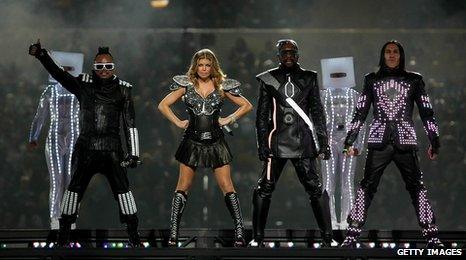A decade of digital downloading from iTunes to Spotify
- Published
Will.i.am: Downloading changed music
In 2004 the first legitimate digital music service took off with the opening of online stores like iTunes.
The portable CD player was slowly replaced by the much less bulky MP3 device, which could hold an inconceivable amount of music.
"I remember we got called to do the first iTunes, iPod commercial," recalls Will.i.am from the Black Eyed Peas.
"They were like, 'We want to use Hey Mama to launch this thing called iTunes,' I'm like, 'What's iTunes?'"
A question we were all asking, but not for long. By the end of 2004 around 14,000 tracks were downloaded per week.
That figure has now rocketed to nearly three and a half million a week in 2013 and in the same year, the one billionth download was recorded.

I Gotta Feeling by Black Eyed Peas was the first download to break one million sales
Will.i.am argues artists don't actually make that much money when their track is downloaded.
"When you take in to account how the money gets split up, the credit card company gets their part," he explains.
"Then iTunes gets their part, then the record company gets their part and you participate from the record company's part.
"So you're not really getting that much money."

Bruno Mars was the most illegally downloaded artist of 2013, say Music Metric
With the dawn of digital downloading came the biggest problem the music industry has ever had to face, piracy.
"It's like going to the hairdressers, having your hair cut and running out," suggests Jessie J about illegal downloading.
"You can't make music for free, you can't live for free.
"Your record label have to make back a certain amount of money when they are spending money on you, to give you the opportunity to make another album."
Despite government and industry efforts to curb the problem, The British Phonographic Industry (BPI) estimates piracy costs the UK music industry around £200 million per year.
"The music industry was the first of the creative sectors to be hit by the effects of piracy," said Lynne McDowell from the BPI.
"In many ways we have taken the lead on tackling it, piracy has certainly contributed to a decline in revenue and job losses over the years."

The digital revolution then extended to streaming services like Spotify.
While will.i.am argues about the artist not getting much money from downloads, the argument is even stronger against streaming services, which pay out less per track.
Some artists benefit enormously from streaming services because of the exposure it can give them, which they may never get on radio.
As for the next ten years, Lynne McDowell from the BPI, says the industry is continuing to evolve.
"We look forward to the impact of 4G and connected TVs and in car audio streaming," she explains.
"All of which are on the horizon and will improve the overall music experience."
On Easter Monday, BBC Radio 1 will be counting down the top 100 downloads of all time.
Follow @BBCNewsbeat, external on Twitter
- Published9 April 2013

- Published15 October 2013
